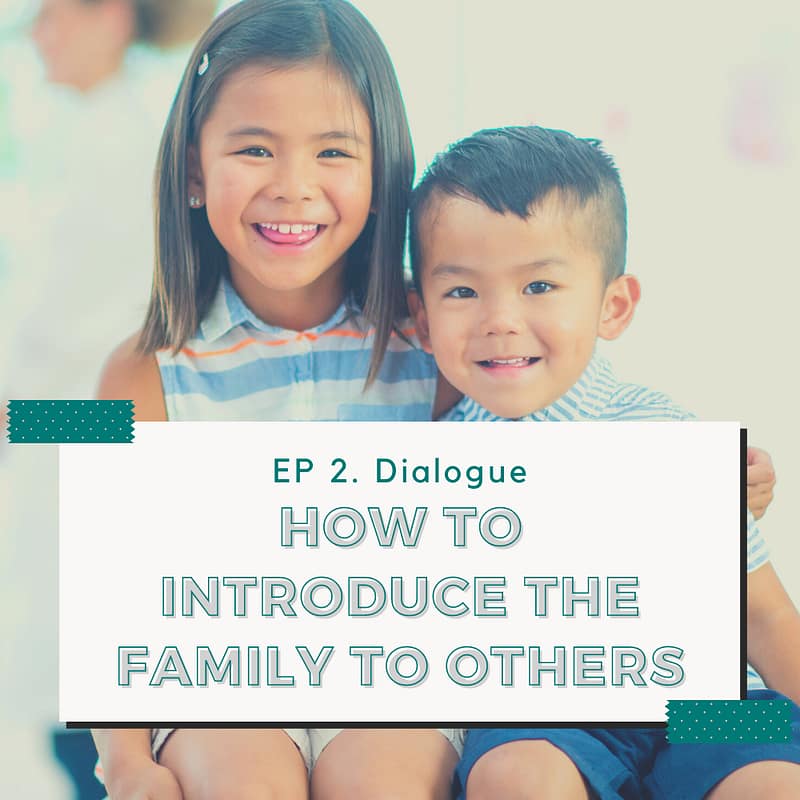Powered by RedCircle
Hello! It’s your host of Korean study café, Vanessa. 잘 지냈어요? How have you been?
Today for the second episode of season two, we will listen to a dialogue written by Korean Study Café about introducing someone to the other.
Then now, shall we listen to the dialogue?
바네사: 안녕하세요? 크리스 씨
Vanessa: Hi Chris
크리스: 안녕하세요? 바네사 씨. 뭐 하고 있어요?
Chris: Hello Vanessa, What are you doing?
바네사: 아, 그냥 제 가족 사진 보고 있었어요.
Vanessa: Oh, I was just looking at my family photos.
크리스: 우와, 저도 같이 봐도 돼요?
Chris: Wow, can I look at it with you?
바네사: 네, 그럼요. 같이 봐요.
Vanessa: Yes, of course. Let’s see it together.
크리스: 이 분은 누구예요?
Chris: Who is this person?
바네사: 아, 우리 남동생이에요.
Vanessa: Oh, it’s my little brother.
크리스: 우와~ 남동생이 정말 잘 생겼어요. 남동생은 지금 무슨 일을 해요?
Chris: Wow. Your younger brother is really handsome. What is your brother doing now?
바네사: 우리 남동생은 한식 요리사예요. 요리를 아주 잘 해요.
Vanessa: My younger brother is a Korean cuisine chef. He can cook very well.
크리스: 우와, 그럼 남동생이 맛있는 음식 가끔 해줘요?
Chris: Wow, then, does your brother sometimes cook delicious food for you?
바네사: 네, 가끔 해줘요. 아주 맛있어요.
Vanessa: Yes, he sometimes does. It is delicious.
크리스: 정말 좋겠어요. 그럼 바네사 씨, 이 분은 누구예요?
Chris: Wow, sounds really great. Vanessa, who is this person?
바네사: 아, 우리 여동생이에요.
Vanessa: Oh, she is my little sister.
크리스: 아, 그렇군요. 그럼 여동생은 지금 무슨 일을 해요?
Chris: Oh, right. So what does your sister do?
바네사: 우리 여동생은 컴퓨터 그래픽 디자이너예요.
Vanessa: My sister is a computer graphic designer.
크리스: 우와, 여동생도 정말 멋져요. 그럼 동생들도 바네사 씨랑 같이 서울에 살아요?
Chris: Wow, the younger sister is really cool too. Then, do the younger siblings live in Seoul with you?
바네사: 아니요. 제 남동생은 부산에 살고 여동생은 제주도에 살아요.
Vanessa: No. My younger brother lives in Busan, and my sister lives in Jeju Island.
We heard a dialogue where Vanessa introduced her family to Chris. When Vanessa was looking at the picture of her family, Chris joined in and asked questions about her family.
Many good expressions are helpful to apply to the actual situation. Then now, shall we break down the dialogue together?
바네사: 안녕하세요? 크리스 씨
크리스: 안녕하세요? 바네사 씨. 뭐 하고 있어요?
바네사: 아, 그냥 제 가족 사진 보고 있었어요.
크리스: 우와, 저도 같이 봐도 돼요?
바네사: 네, 그럼요. 같이 봐요.
After greeting, Chris asked 뭐 하고 있어요?. 뭐 means what, and 하고 있어요? means “Are you doing?
Vanessa replied, “그냥 제 가족 사진 보고 있었어요. I was just looking at the photo of my family.”
And then Chris asked “저도 같이 봐도 돼요? Can I see it together?” and Vanessa said “네, 그럼요. 같이봐요 Yes, sure. Let’s see it together.”
Then Chris goes on to ask :
크리스: 이 분은 누구예요?
바네사: 아, 우리 남동생예요.
Here “이 분” literally means “This person” in an honorific way to say he or she in Korean. Also, there is another way to say he or she in Korean, which are 그 or 그녀. However, Koreans rarely use these words in everyday conversation. These words usually are used in literature, poems, or lyrics to indicate the main character in many cases with a romantic nuance. So if you use these words in everyday conversation like English, Korean native speakers might think you have someone in a somewhat romantic relationship.
So the alternative way to say “he 그 or she 그녀” is “이 분, 그 분, 저 분, this person, that person, that person (over there)” if you want to show some respect. or if you want to keep a neutral tone, you can just say “이 사람, 그 사람, 저 사람.” If you think of this expression from an English perspective, it might sound wrong to you, but actually, it sounds more respectful in Korean.
So when Chris asked “이 분은 누구예요?” it means “Who is he or she? ” (literally this person in an honorific way) So you can utilize this expression in many situations like when you want to be introduced to someone by others.
And then Vanessa answered, 우리 남동생이에요. It’s my younger brother. 우리 literal translation is we/us/our, but it actually means “my” and 남동생 younger brother and 이에요 is the verb of this sentence, which is the verb, to be (is).
So to say it’s something or someone, you can use this sentence structure “so and so 이에요 or 예요.” The former one is paired with the word ending with Batchim 받침, and the latter one is paired with the word ending without Batchim 받침.
Okay, we learnt good expressions for daily conversation. And now, let’s move on to the next part.
크리스: 우와~ 남동생이 정말 잘 생겼어요. 남동생은 지금 무슨 일을 해요?
바네사: 우리 남동생은 한식 요리사예요. 요리를 아주 잘 해요.
크리스: 우와, 그럼 남동생이 맛있는 음식 가끔 해줘요?
바네사: 네, 가끔 해줘요. 아주 맛있어요.
Chris said 남동생이 정말 잘 생겼어요 which means her younger brother is handsome and continued to say “남동생은 지금 무슨 일을 해요?” What does he do now (for a living)? Chris asked about Vanessa’s younger brother’s job.
So Vanessa answered back, 우리 남동생은 한식 요리사예요, “my brother is a Korean cuisine chef” and added, 요리를 아주 잘 해요”He’s very good at cooking.”
Then Chris asks if he sometimes cooks delicious food for her, and she said yes, he sometimes does.
Wow, that would be so good to have someone who is a chef cooks for you, right? Hahaha, All right, then now let’s go on and listen to the next part.
크리스: 정말 좋겠어요. 그럼 바네사 씨, 이 분은 누구예요?
바네사: 아, 우리 여동생이에요.
크리스: 아, 그렇군요. 그럼 여동생은 지금 무슨 일을 해요?
바네사: 우리 여동생은 컴퓨터 그래픽 디자이너예요.
Oh, since we went over similar expressions before, we are now pretty familiar with this part. Then I will leave this part for you to predict what it means.
If you want to check out the meaning, visit the Korean Study Café website at Koreanstudycafe.com/podcast to read through the transcript with the translation.
Then let’s check out the parts that we haven’t seen before. First of all, Chris said 좋겠어요. Well, this is indeed an excellent expression to react to others. It means 좋다 to be good, 겠어요 Should or must be, so as together, it means “it should be good.”
So if you know these types of expressions and use them in a conversation with a native speaker, it helps you sound much more natural and smooth.
The rest of the part is what we already have seen together except for the word 컴퓨터 그래픽 디자이너. This term is actually from English. Would you please try to guess what this is? I will give you three seconds. 하나, 둘, 셋…. Okay, that’s a computer graphic designer. Hahaha, do you think it sounds pretty similar to English? All right. 그럼 우리 이제 마지막 부분 같이 들어봐요. Let’s go on and listen to our final part.
크리스: 우와, 여동생도 정말 멋져요. 그럼 동생들도 바네사 씨랑 같이 서울에 살아요?
바네사: 아니요. 제 남동생은 부산에 살고 여동생은 제주도에 살아요.
Wow, don’t you think Chris is such a good praiser? What he said was 여동생 정말 멋져요 for responding. 멋져요 means “she is cool/amazing,” So he praised that her young sister is really cool/amazing.
Then he follows with another question, “do the younger siblings live in Seoul with you?” And Vanessa responded that her brother lives in Busan and her sister lives in Jeju island. This is an excellent expression to state where someone lives.
So try to use this sentence structure and say it based on your case in Korean.




